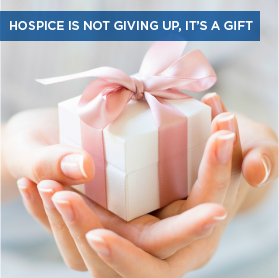
what is hospice?
Hospice is a well-established model of care for patients at the end of life. It includes a team of professionals, including doctors, nurses, certified nursing assistants, therapists, social workers, chaplains and volunteers, whose only goal is to ensure that each patient receives the individualized attention, respect, dignity and medical support they need.
Contrary to popular belief, hospice neither speeds up nor slows down the dying process. Rather it supports patients in the final stage of life. Choosing hospice does not mean giving up hope. It’s about living life to the fullest – the fullest and most comfortable life the patient has in his or her remaining time. It’s not about adding time to their life, but rather about adding life to their time.
Hospice Facts:
- Hospice is appropriate for patients with a variety of end-stage conditions, including cancer, congestive heart failure, chronic obstructive pulmonary disease, kidney disease, and Alzheimer’s disease or other forms of dementia.
- Family members are actively involved in hospice care, planning and decision-making.
- Hospice care can occur in many places, including the patient’s home, as well as hospitals, assisted living or nursing centers, or freestanding hospice facilities, such as the new Community Hospice House in Richmond. Although our staff will not be physically located in your personal residence at all times, our nurses are available by phone 24 hours a day, 7 days a week, and can conduct home visits when needed. In hospice care, patients also can continue to work with their regular physicians whom they’ve come to know and trust.
- Payment for hospice care may come from Medicare, Medicaid, private insurance and private pay, depending on a patient being able to satisfy certain criteria. The Medicare Hospice Benefit pays for many services, including medical supplies, equipment and prescriptions that are directly related to the hospice diagnosis, as well as respite care and other services.
Hospice Myths
There are many myths about hospice care. We help dispel those myths so you understand the truth.
MYTH: Going into hospice means the end of all medical treatment and an abandonment of the patient.
TRUTH: This is incorrect. In fact, hospice provides care that allows individuals to have control at the end of life, to be as comfortable as possible, and to be treated with dignity. Hospice does not hasten the end of life; it ensures that patients receive the attention they deserve and the medical support they need.
MYTH: A patient cannot leave hospice care to seek curative treatment.
TRUTH: Hospice care is not a one-time only choice. It is indeed possible to postpone hospice care at any time and for any reason, e.g., a patient wishes to try a new treatment or their prognosis improves. A patient can always re-enter hospice care again if requested.
MYTH: Hospice is only about death.
TRUTH: In reality, hospice is about choices, and how a person chooses to live his or her final days. In other words, hospice is about:
- Quality of life, not quantity.
- Being able to comfortably manage physical symptoms such as pain, respiratory problems, digestive issues, spiritual or emotional distress, and other stressors.
- Having a wide range of compassionate caregivers who offer a spirit of comfort, advice, acceptance, and peace, all without judgment.
eligibility
To qualify for hospice coverage, specific criteria must be met. Bon Secours Hospice program staff will assist you with this process. Medicare, Medicaid and many private health insurance policies can provide hospice services. It is best to confirm coverage with your employer or health insurance provider. If you meet the hospice admission criteria, care will not be denied, diminished or discontinued due to an inability to pay.
To be eligible for hospice coverage under Medicare or Medicaid, a patient must have a medically confirmed “terminal illness,” which is defined as having a life expectancy of six months or less if the illness runs its normal course. You also must choose to receive hospice care services rather than curative treatments for the illness.
our approach
In our 30 years of experience, we have learned that the hospice experience is one of life’s greatest teaching tools because it helps patients and families come together and reflect on what’s truly important in life. In this way, patients feel and experience life more deeply. They focus more on feelings such as love, gratitude, dignity and grace. They find peace beyond the pain of their illness. The Bon Secours Hospice program helps them achieve that by combining the best features of traditional hospice with the most up-to-date, compassionate care that emphasizes personal choice, respect and quality of life.
The ultimate goal of our team of physicians, nurses, certified nursing assistants, social workers, chaplains and volunteers is to ensure that each patient receives the individualized attention and medical support they need. We excel at providing comprehensive, holistic support and guidance because of the close relationships we build with patients based on trust, respect and an appreciation for each person’s desired experience.
Our team won’t tell a patient what decisions to make, because it’s different for every person. Instead, we will ask, “What does the patient want or need?” Our role is to listen carefully and provide options – and the rationale behind them – so the patient and their family can make the decision that’s right for them.
